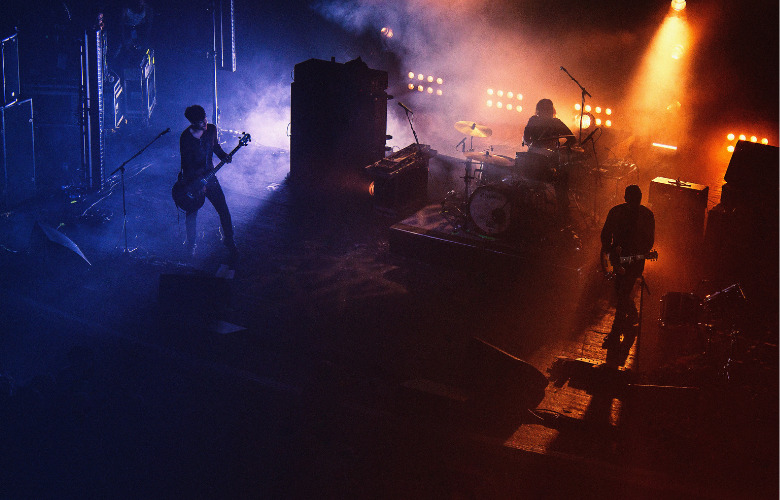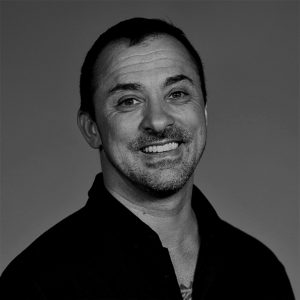
Rebekah Foster has been in the entertainment business for over 35 years. While she studied sports medicine at university, her passion for music – specifically audio engineering – and the arts proved to be the stronger force. Rebekah was willing to work anywhere so she could gain experience and find a firm foot hold in the industry.
I’m from the Bronx in New York, with deep ties to Bermuda.
There has always been music and theatre in my life. They’ve been and are an essential part of who I am.
In school I loved sports. But something happened to my knee and prevented me from becoming more involved. I became a student trainer and went to university and started to study sports medicine. My plan was to be an athletic trainer.
But music just kept jarring me. I started as a DJ, which led me to audio and to doing local gigs around New York where I worked with several different sound companies.
This led me to doing gigs within all musical genres. I was the lady with the van and worked with many of the Jazz greats in my early career.
Then KRS One from Boogie Down productions came and heard me mix. He liked what I did which led me to start working with him and BDP, live as well as in the studio.
1987 I founded my own company, Ujima Sound Productions Ltd to provide production management and tour management. Ujima means “collective work and responsibility.” People kept calling me for work. This was a way to help them and bring them on board.
While working with KRS One, I still did Jazz gigs as well. Then I left KRS One and two days later Queen Latifah’s team called and said, “I heard you are available. Do you want to come work with us?”
This was in 1991. I said yes and went to work with her and her company Flavor Unit.
I began getting more and more work. I worked with the great Chris Lighty (until his death) & Violator Management. That led me to work with A Tribe Called Quest, Missy Elliot, Busta Rhymes, and Marcus Miller as well. To name just a few of the artists I had the privilege of working with.
I worked hard for it, and my career kept evolving…
There is a specific sound company that I kept sending my resume to since the late 80ies. 3 to 4 times a year. I kept asking them for a job, even offered to come and work for free. I was just trying to get a job with a big sound company. But the answer was always “No.” Year after year.
Which showed me very clearly that it is important how you treat people. You meet the same people on the way up as you do down.
It’s imperative to always be professional and carry yourself in a way so when people hear your name it brings back a good thought not a bad one.
Many times, especially in the early days, I was the only woman on the crew.
When I worked at See Factor, I might have been one of only 2 black people (back in the Eighties). I worked with Bob See who is an industry legend.
I kept on learning. I was able to either go out as a road manager or an engineer. My company grew. People were looking for certain technicians which gave me the opportunity to spread the work around. There were so many people looking for work.
There were cliques. People came up to me who might not be able to get those gigs because they were not part of any clique. Bringing them in was very important to me.
We also did a lot of mentoring. Young people came to intern with us. We told them, “Come after school. See if you like it. See if you’re interested in this.”
Additionally, we partnered with an organization in New York which worked with at risk teens. Every year, I got a couple of their kids who they thought showed promise.
Everyone wants to be a star. But there are a million jobs around those stars. And the people in those jobs are the ones who make it all happen behind the scenes.
While I road managed and tour managed, I kept on audio engineering. Because audio was my first love.
In the beginning of my career, it was really difficult as a person of color to get a job on a tour with white artists. So, we worked for black artists.
In New York, African Roots Sound, Eastern Stage Productions, and I often worked together on gigs. If I couldn’t handle a gig with my small company then I’d call them so we could do the gig.
Sometimes, I’d be on a tour and they’d say, “No, we’d love to take you, but you can’t share a room because you’re the only female. We don’t have enough rooms.” All those little roadblocks were there too.
I was fortunate, blessed, but it was a lot of hard work.
In the beginning, when I worked in recording studios, you’d do a gig for lunch or train fare. You just wanted to get in the door.
Fortunately, over the years it became word of mouth. And people called me for work on an ever more regular basis.
I was touring with Queen Latifah when I got the call that Whitney Houston was going to go on her South Africa tour. They needed an assistant tour manager. I was offered the job and worked together with the legendary Tony Bulluck who was the tour manager. And we toured through South Africa with Whitney Houston.
I was lucky to be able to work with a lot of great artists and good management teams.
I was also versatile. I could do anything. Production manager, tour manager, front of house, monitors, whatever was needed.
Next to having work for myself, it was of major importance to me to be able to give others work as well.
You never knew what you could find. Talented people were everywhere.
In 1991 for example, I was on tour with Naughty by Nature and their song OPP was huge. As was Hip Hop Hurray. Those were gigantic hits for them.
At that point those records went global. So, Naughty by Nature went on tour. They did their first big show for C&C Music Factory at Radio City Music Hall.
They called me for the gig even though their producer Kay Gee at first wanted to do the audio himself as the DJ on stage. But, the next day, I was on the gig.
Naughty By Nature are from East Orange, New Jersey. They’re from the hood. I got to East Orange and we pulled up in front of Kay Gee’s house. There were three tour busses there. “Why three?” I asked.
One bus was for us and the band and the other busses were for whoever wanted to go on the bus.
They did well so they wanted everybody who wanted to come along to be able to come. You just had to figure out a way to make yourself valuable.
Over time, three busses became two, then one. But out of all those people who initially tagged along, there was one kid who learned everything. Fast forward to today, outside of the pandemic. Everyone knows his name in the industry. He turns down gigs. He has worked for all the big names by now.
So, you never know where you’re gonna find somebody or what potential a person has.
Now, working with Roadies Of Color United, we just want to make sure that all the talented people out there who are not getting opportunities, are being given a chance.
It used to be that there were no black people on white tours. At the same time, white technicians didn’t want to do the black tours.
But then the black music market became ever more successful. The table turned yet again. But this wasn’t just positive. It was also problematic: An act came out. They’d be within their community. Everybody’d be black. But once they’d get a big hit, the record label would tell them, “No, you gotta go with this guy.”
They’d change and would now be represented by a white manager. The manager would then hire his team and the crew would be all white. Rarely would any of the original crew stay on board.
So, you see, it used to be segregated in black artists/black crews and white artists/white crews. Now it is almost reversed. And in a strange way it is becoming more difficult for black industry professionals to find work with black artists or work in general. Because now, the white crews are doing more of the black gigs. But the black professionals still don’t work with many of the rock or country artists.
You can count on one hand how many white acts have black people working for them. Especially black women who are still a rare occurrence backstage on white tours.
One of the best engineers I’ve ever worked with, Dennis Thompson, is a legend. He was one of Bob Marley’s engineers. Dennis is also my mentor.
He’d be so much more of a household name if he had had the opportunity to do a lot more of the high-profile white gigs. But that opportunity wasn’t there for him.
With support groups like Roadies Of Color United and Diversify The Stage, etc., all we want to do is level the playing field and give everyone a fair shot.
People call who they know. But we all know there are also other people out there who are good at what they do.
That’s what my career has been about. Not only trying to keep working myself, but also to try to keep people working, to spread the gigs around.
The way the economy is, things are getting tighter. It’s not so easy anymore to bring a few guys along just so they can observe and learn.
But I’ll keep on trying. I’ve always tried to have a good work ethic and do as much as I can. But what is of paramount importance is to lift other people up. I got in the door. But I did it so I could hold the door open and keep it open for other people, too.
Rebekah’s social media handles:
Martin Thomas, Lighting Designer – Black History Month, R. O. C. U.
Roadies Of Color United – End Of The Year Reflection


Liam Klenk was born in Central Europe and has since lived on four continents. Liam has always been engaged in creative pursuits, ranging from photography and graphic design, to writing short stories and poetry, to working in theatre and shows. In 2016, Liam published his first book and memoir, 'Paralian'.
Read Full Profile© 2021 TheatreArtLife. All rights reserved.

Thank you so much for reading, but you have now reached your free article limit for this month.
Our contributors are currently writing more articles for you to enjoy.
To keep reading, all you have to do is become a subscriber and then you can read unlimited articles anytime.
Your investment will help us continue to ignite connections across the globe in live entertainment and build this community for industry professionals.